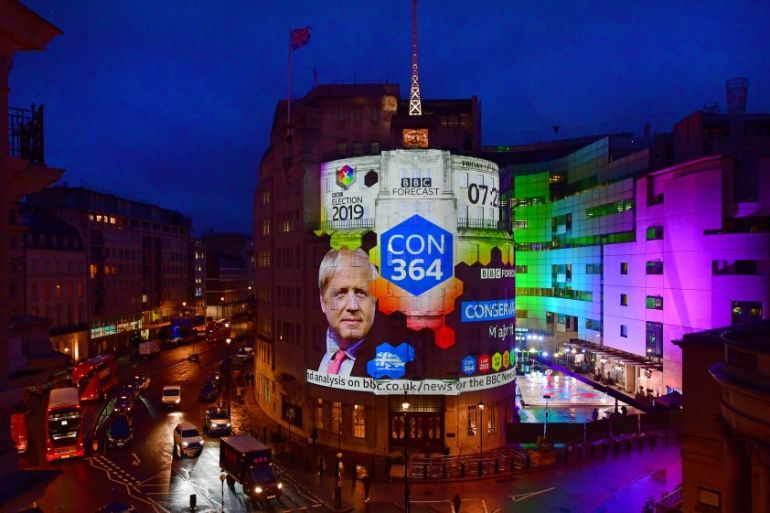UK’s ‘historic’ general election: Five things to know
British PM Johnson’s sweeping win sets UK on course to depart the EU by the end of January.

Boris Johnson’s Conservative Party has won a landslide election victory, marking a seismic shift in British politics and paving the way for its exit from the European Union by the end of January, 2020.
Here are five things to know about the vote:
Keep reading
list of 3 itemsJeremy Corbyn: Shattered dreams of global radical left revolution
Transcript: Boris Johnson’s election victory speech in full
What happened?
Johnson’s Conservatives swept to victory in Thursday’s general election, winning 364 seats in the UK’s 650-seat House of Commons, with one constituency yet to declare a result.
The performance marked the party’s best electoral performance for more than three decades and delivered Johnson a handsome Commons majority of 79.
The Conservatives’ success came mainly at the expense of the main opposition Labour Party, which limped to a return of 203 seats – its worst showing since 1935.
What led to Labour’s demise?
Johnson’s simple and relentless pledge to “Get Brexit Done” and pull the UK out of the EU by January 31, 2020, resonated with an electorate wearied by more than three years of turmoil – and months of parliamentary deadlock – over how to execute the Leave result delivered by the 2016 referendum.
The Conservatives made major gains across Labour’s so-called “red wall” post-industrial strongholds in the Midlands and north of England, where already fraying loyalties finally ruptured over Brexit.
Johnson, 50, convinced swaths of disgruntled, pro-Leave Labour voters in these regions to switch sides, while also retaining the support of his base.
What next for Brexit?
Now that Johnson has the parliamentary majority he craved, the UK is expected to leave the EU by January 31.
He will bring his Brexit deal back to Parliament next week.
The prime minister has promised to “get straight to work” and begin the legislative process to pass his Brexit withdrawal agreement through Parliament in order to action the UK’s exit from the bloc.
“We will get Brexit done on time by the 31st of January, no ifs, no buts, no maybes,” Johnson said in a speech delivered to cheering supporters on Friday morning.
EU Council President Charles Michel said the bloc was ready to embark on trade talks with Britain and will do the utmost to protect European priorities after Johnson’s election win.
However, analysts have warned that the years-long political crisis is far from over, with lengthy negotiations over the future of EU-UK relations expected.
What next for the opposition?
Labour’s dismal performance prompted its left-wing leader, Jeremy Corbyn, to announce he would resign as party leader.
Corbyn said he would continue in his role for an interim period while the party discussed its future in a “period of reflection”.
The 70-year-old went into the election campaign with the lowest net satisfaction ratings of any opposition leader since the late 1970s, according to polling conducted by Ipsos Mori, and struggled to win support for his progressive manifesto from voters outside his loyal base.
Jo Swinson, leader of the pro-EU Liberal Democrats party, lost her seat to the Scottish National Party (SNP), which made major gains in Scotland’s 59 constituencies.
What does the vote mean for the Scottish independence bid?
While England and Wales voted to leave the EU in the 2016 referendum, Scotland and Northern Ireland voted to remain in the bloc.
Scotland’s pro-independence first minister, Nicola Sturgeon, who leads the SNP, has repeatedly said that her UK constituent nation should be allowed the right to hold a second referendum on Scottish independence – so Scotland could remain in the EU.
The first Scottish independence referendum in 2014 saw most Scots voting to remain in the UK.
“Indyref2”, as it is known, would need the UK government’s approval.
Sturgeon repeated her call on Friday following the SNP’s victory in 48 of Scotland’s 59 seats, stressing a need for a second referendum.
“Scotland has sent a very clear message,” she said. “We don’t want a Boris Johnson government, we don’t want to leave the EU.”